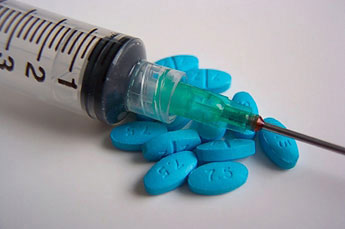Alpha feto-protein (AFP) test is one of the pregnancy tests which help to detect birth defects in foetus. Read on to know more about Alpha feto-protein test.AFP or Alpha Feto-Protein test is one of the prenatal tests done during the second trimester of pregnancy. This test is carried out to check the levels of Alpha feto-protein in pregnant woman’s blood. Alpha Feto-protein is produced by foetus and it mixes with pregnant woman’s blood during pregnancy. High levels of AFP in woman’s blood can be a sign of foetus suffering from birth defects. However, some other factors may also lead to high levels of AFP in blood.
What is the AFP Test?
This is a blood test that measures the amount of alpha-foeto protein (AFP) in the mother's blood and the amniotic fluid. It is generally performed in the 15th to 17th week of pregnancy. High levels of AFP could indicate that the baby has a neural tube defect (NTD). This defect manifests itself as
spina bifida (deformity of the spinal column) or anencephaly (the absence of all or part of the brain). Abnormally low levels could be a sign of increased risk of Down's syndrome or other chromosomal defect. 95% of the time there is no past family history of these conditions.
What Does a Positive AFP Test Indicate?
A positive AFP test signifies that foetus have abnormalities like:
- Spina bifida
- Deformities in abdominal wall
- Down’s syndrome
- Other genetic defects
Sometimes high level of AFP is detected in twin pregnancies where more than one of the foetus is producing AFP. And sometimes this test may even show false positive results in case of miscalculated due dates.
Who is Advised to Undergo AFP test?
Pregnant women who have family history of
birth defects, pregnant women who are 35 years old or more than that, women who have consumed unsafe medicines or drugs during pregnancy, pregnant women who come in contact with harmful radiations, pregnant women who have diabetes and take insulin and women who suffer from viral infection during pregnancy are advised to undergo AFP test or
triple marker test (test which screens for AFP, hCG and estriol).
How accurate is the AFP test?
The drawback of this test is that abnormally high or low levels of AFP in the blood do not necessarily indicate that your baby will have a birth defect. Statistics show that while only 1 to 2 women in a 1000 have a foetus with a neural tube defect (NTD), about 50 of these women will demonstrate high levels of AFP in their blood when tested. Thus, to make a positive diagnosis, further testing such as
amniocentesis and a sonogram becomes necessary. An elevated level of AFP in the amniotic fluid is associated with a 90 % chance that the foetus has NTD.
What is done in case of positive AFP test?
When AFP test shows positive result pregnant women are advised to undergo some more tests. Such tests are done to find out if everything is fine or there is actually some problem. An ultrasound scan, second AFP test and amniocentesis are recommended in such cases. These tests will help your obstetrician to do detailed observation of your pregnancy and diagnose problem in early stages.
AFP test is one of the optional prenatal or genetic tests for you if your pregnancy is normal. Although, most of the women test normal for high levels of AFP, but undergoing such type of test will help you be cautious about the birth defects in foetus (if any). Taking AFP test during pregnancy is not harmful for the baby or mother. If you are concerned or if your pregnancy comes under the category of high risk pregnancies, you must talk to your obstetrician and clear your doubts about AFP test and all the other pregnancy tests which you need to undergo in order to prevent complications.
Is it necessary to take Alpha Feto-protein (AFP) test during pregnancy? Who is advised to undergo Alpha Feto-protein? How is Alpha Feto-protein test done? Discuss here. 





























